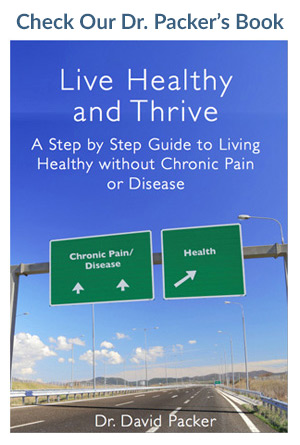 If you suffer from spinal pain, it is common – and understandable – that your first concern may be getting rid of the pain. After all, many people with pain simply want the pain to go away and get better. This can lead you to seek treatments that focus on relieving pain, without necessarily addressing the underlying cause of the pain.
If you suffer from spinal pain, it is common – and understandable – that your first concern may be getting rid of the pain. After all, many people with pain simply want the pain to go away and get better. This can lead you to seek treatments that focus on relieving pain, without necessarily addressing the underlying cause of the pain.
However, spinal pain is often a symptom of an underlying problem. For this reason, although treating the pain is important, it is equally important to fix what is causing the pain.
As a licensed chiropractor and primary spine care management specialist with more than 20 years of experience, I am an expert in helping patients with spinal conditions that cause pain. Instead of a quick fix, my treatments focus on correcting the underlying issues that cause your spinal pain in the first place.
Causes of Spine Pain
Back pain can be the result of many different underlying issues. These include, but are not limited to biomechanical problems. In medical terms, biomechanics refers to the structure and function of your body and how it moves. When the biomechanics of your spine become unstable, nerves can send pain signals to your brain. This can be due to:
- Hypomobility: Hypomobility refers to a decreased range of motion. It can occur when the ligaments in your spine are too short or too tight. If left untreated, hypomobility can cause damage including degeneration of tissues in the spine. A doctor may test for hypomobility by asking you to bend down and touch the floor with your fingers. Other tests may include a CT scan or MRI.
- Hypermobility: Hypermobility means that there is an excessive range of motion. The ligaments in your spine are too loose when they are hypermobile. This leads to a situation where your spine is not getting the support it needs, which can lead to instability and pain. Hypermobility can be caused by various medical conditions including Ehlers-Danlos Syndrome.
- Inactivity: Inactivity is a major cause of back pain. Inactivity is linked to degenerative disc disease of the spine, which also causes back pain. Inactivity can also lead to physical deconditioning, which is linked to back pain. This pain can cause you to be more inactive, perpetuating the cycle of pain.
- Repetitive movements: Repetitive motions can strain and weaken the tissues in your back, leading to pain. Movements that can result in these injuries include bending, pulling, reaching, straining, and twisting.
- Trauma: Acute injuries can lead to back pain. Common causes of traumatic injuries include car accidents as well as falls.
- Degenerative disc disease: Degenerative disc disease is a major cause of back pain. Over time, degenerative disc disease can lead to complications such as bulging and herniated discs.
Importance of Finding the Underlying Cause of Back Pain
It is crucial to find the underlying cause of your back pain before you begin to treat it. The reason for this is that permanent damage can start to occur within 6 months. This damage can occur whether or not pain is present.
For this reason, it is possible to end up with permanent spinal problems if you manage to successfully treat the pain without correcting the underlying issue. This damage can include:
- Arthritis: Arthritis is a major cause of pain and stiffness in the spine. This condition can lead to further painful complications in the spine like bone spurs, spinal cord compression and pinched nerves. Arthritis can be diagnosed with tests including X-rays, CT scans and MRIs.
- Abnormal bone remodeling: Bone remodeling is a lifelong process. In normal bone remodeling, old bone tissue is removed and new tissue is formed. However, abnormal bone remodeling can lead to problems with bone formation, including incomplete bone replacement.
- Scar tissue: Collagen is the main structural component of connective tissue and can result in scar tissue. Scar tissue can occur after injury to a muscle, tendon, or ligament in your back. Without proper treatment after an injury, the collagen can form abnormal clumps called adhesions. Adhesions can cause tissues in your body to stick together when they should not.
Importance of Avoiding Unnecessary Treatments
Spinal treatments should always be based on high-quality medical evidence. However, some providers may encourage patients to undergo unnecessary treatments.
Unnecessary treatments can take a couple of different forms. These include providers who either try to undertreat or overtreat your spinal pain, such as:
If you are told to come back only if your back begins to hurt again: A provider who gives you a quick fix for your back pain may not have fully assessed the underlying cause of the pain. Since damage to your spine can occur with or without pain, a provider should make sure that the underlying cause of the pain has been corrected before discontinuing treatments.
If you are told to keep coming back regularly, even when the underlying problem has been corrected: Many spinal problems can take weeks or months to fully correct. After a period of intensive treatments to correct the underlying problem, most patients should be able to reduce the number of treatments they receive. If the underlying cause for your spinal pain has been corrected but a provider is still recommending intensive care, you may be at risk for overtreating your condition.
Tips to avoid unnecessary treatments include making sure:
- Ask why tests and treatments are being prescribed
- Ask how tests and treatments impact your care
- Ask for periodic reevaluations of your medical condition
- Ask about the doctor’s goal in treating your condition, and how the tests and treatments help achieve that goal
Why a Spine Care Specialist Is Important
Finding a doctor who specializes in spine health is vital. A doctor with expert training in the spine will be able to fully assess the underlying spine problems that you are experiencing. As such, the doctor will not only be able to treat your pain but also will be able to address the underlying problems that caused your pain in the first place. This will help stop the underlying problem from worsening and causing complications.
Precision Spinal Care’s Commitment to Spinal Health
I am an experienced expert in spine health. My training allows me to competently and safely address the underlying conditions that are causing you pain. I am trauma and hospital-qualified and have credentials in MRI spine interpretation, spinal biomechanical engineering and orthopedic testing through the Academy of Chiropractic. I am also a fellow in Spinal Biomechanics and Trauma which is recognized through the SUNY Buffalo Jacobs School of Medicine.
At Precision Spinal Care I am happy to help you determine the best way to treat your herniated or bulging discs. Call our office at (757) 382-5555 to speak with me or set up a consultation. You can also set up an appointment through our webpage.

